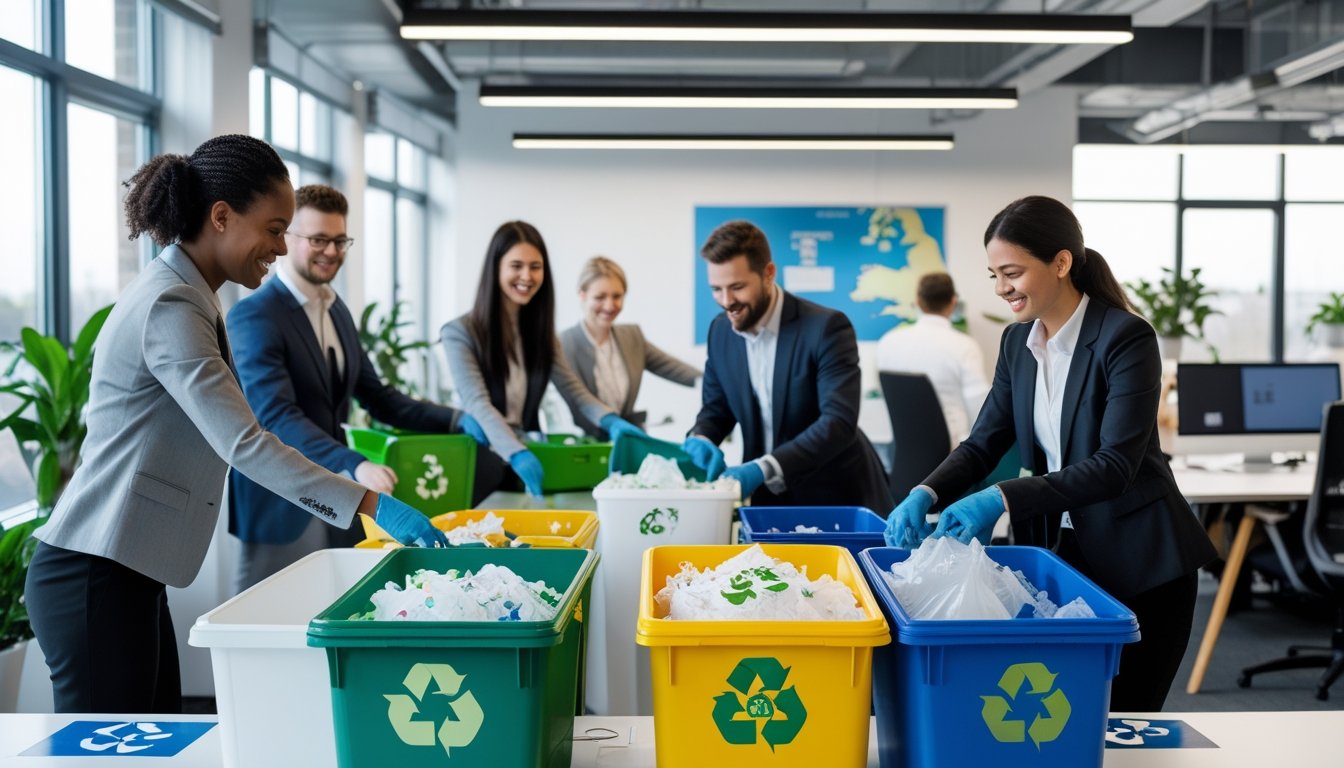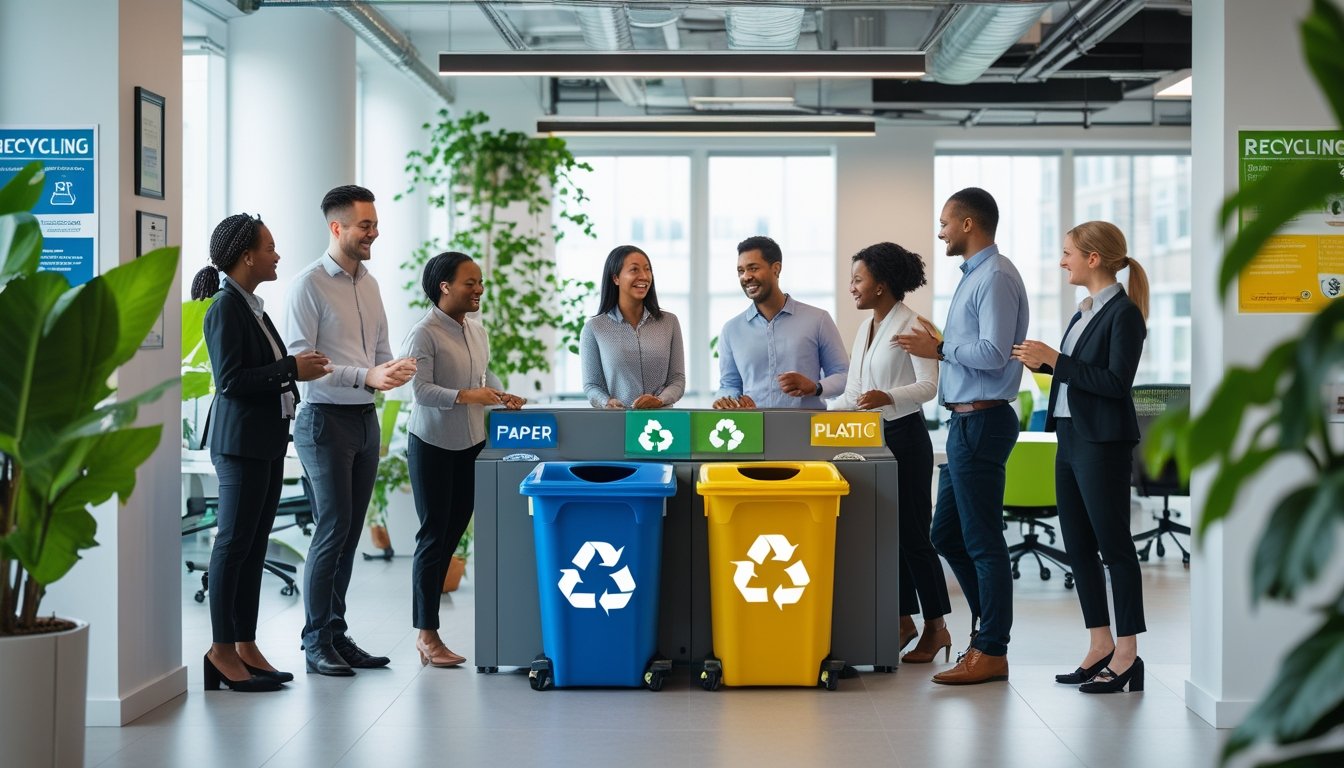Late updated: 22 May 2025 15:05
Written by: Amber Collins
Promoting Recycling Initiatives In UK Workplaces: Strategies for Sustainable Success
In recent years, the significance of recycling has gained momentum across the UK, particularly within workplace environments. Encouraging recycling initiatives is not just about compliance but creating a culture of sustainability that benefits both the environment and business operations. Implementing effective recycling programs can significantly reduce waste production and promote environmental responsibility within our organisations.

We understand the challenges faced by many workplaces in adapting to new sustainable practices and guidelines. By fostering recycling efforts, we can influence positive behavioural changes among employees and contribute to a more sustainable future. From organising interactive workshops to ensuring clear recycling policies, there are myriad ways to engage our teams effectively.
Our approach to recycling in the workplace needs to be strategic and well-thought-out, emphasising the importance of collaboration and employee engagement. Empowering employees to participate actively in recycling efforts not only enhances sustainability but can also lead to cost savings and a positive corporate image.
Key Takeaways
- Recycling policies help reduce workplace waste.
- Employee engagement is pivotal for successful recycling practices.
- Sustainable initiatives can benefit both the environment and businesses.
Essential Strategies for Promoting Recycling in UK Workplaces

To effectively promote recycling in UK workplaces, we need to focus on creating robust recycling systems, engaging and educating employees, and ensuring proper waste separation. These elements work together to foster a sustainable workplace environment.
Implementing Effective Recycling Systems
Establishing effective recycling systems in the workplace begins with the strategic placement of recycling bins. It's essential to position recycling bins in high-traffic areas such as break rooms and meeting rooms. Clearly label bins for different types of recyclables — paper, plastics, metals, etc. — to facilitate easy disposal.
We must prioritise educating employees on the types of materials that can be recycled. Additionally, setting up a digital or physical communication board that regularly updates on recycling rates can be beneficial. This transparent approach helps to track the progress and effectiveness of recycling efforts and encourages continued participation from all team members.
Workplace Engagement and Education
Engagement and education play vital roles in reinforcing the importance of recycling. One strategy involves running workshops or training sessions to inform about sustainable waste management practices and their environmental impact. Leaflets and informational posters can be distributed to highlight the benefits of proper recycling procedures.
Involving employees in the recycling initiative through feedback sessions allows us to make adjustments based on observations and suggestions. Offering incentives or recognition for teams or departments that perform well in recycling can foster motivation. Encouraging employees to become recycling champions not only aids in promoting system usage but also cultivates an organisational culture centred around sustainability.
Waste Separation and Contamination Prevention
Waste separation is crucial for effective recycling, as mixing materials can lead to contamination and reduce the quality of recycled goods. Implement practical guidelines for waste separation, emphasising the importance of keeping non-recyclables out of recycling bins.
We must guide employees on checking for contamination: ensuring containers are rinsed free of food residue before disposal avoids contamination. Regular audits can be conducted to monitor the levels of contamination and identify areas for improvement. Additionally, visual aids around waste disposal stations can serve as quick reminders for staff, reinforcing the correct disposal methods.
By implementing these strategies, we aim to significantly boost recycling efforts within UK workplaces, contributing towards a more sustainable future.
Maximising Environmental Impact Through Sustainable Practices

To effectively implement sustainable practices in UK workplaces, it is essential to address key areas such as reducing single-use plastics, accurately measuring recycling rates, and aligning with broader environmental goals like net zero and the circular economy. By focusing on these areas, employers can significantly enhance their environmental impact.
Reducing Single-Use Plastics and Plastic Packaging
Reducing single-use plastics is crucial for minimising environmental impact. Let's start by evaluating our use of plastic bottles and packaging.
Initiatives to Reduce Plastic Use:
- Implement incentives for using reusable containers.
- Set up water refill stations to curtail plastic bottle dependency.
- Replace plastic packaging with sustainable alternatives, such as paper or biodegradable materials.
Employee education is vital. Creating awareness about the detrimental effects of single-use plastics encourages a cultural shift towards more sustainable practices. Additionally, partnering with vendors who use recycled plastic can further fortify our efforts.
Measuring Workplace Recycling Rates
To truly understand the impact of our recycling initiatives, we must measure workplace recycling rates accurately. Monitoring these rates provides insights into the effectiveness of our recycling programmes and helps in identifying areas for improvement.
Steps to Enhance Recycling Measurement:
- Conduct regular audits of waste disposal practices.
- Use clearly labelled bins to categorise recyclables effectively.
- Employ tracking software to record and analyse recycling data over time.
Collecting data on recycling rates not only helps refine our strategies but also fosters accountability. By understanding where we stand, we can make informed decisions to bolster our recycling efforts.
Aligning with Net Zero and the Circular Economy
Aligning our workplace practices with net zero commitments and the circular economy enhances sustainability. The focus is on reducing greenhouse gas emissions and shifting towards a low-carbon economy.
Strategies for Alignment:
- Adopt policies that reduce energy consumption and thereby lower emissions.
- Partner with supply chains committed to circular economy practices.
- Encourage the repurposing and reusing of materials within the workplace setting.
Integrating these principles into our workplace culture and strategy not only contributes to global sustainability goals but also promotes innovation and efficiency. By creating a sustainable workplace, we can significantly lower our environmental footprint, paving the way for a greener future.
Frequently Asked Questions

As businesses in the UK strive to improve their environmental practices, recycling becomes a focal point. Here, we address common inquiries relating to recycling initiatives, detailing strategies, requirements, motivation, resources, and measurement of success.
What are the most effective strategies for implementing recycling programmes in an office environment?
A clear recycling policy is crucial. Regular audits identify areas for improvement. Workshops and meetings can educate employees. Accessible bins and clear labels aid in proper waste separation. It’s essential to integrate recycling into the company culture for lasting impact.
What are the legal requirements for recycling in UK businesses?
UK businesses must comply with waste regulations. These include proper sorting and disposal methods to meet legal standards. Businesses producing over a certain amount of waste need a duty of care note. It's essential to stay informed about local council guidelines and national legislation.
How can employees be motivated to participate consistently in workplace recycling schemes?
Motivating employees involves rewarding participation, whether through recognition or incentives. Regular communication, such as newsletters, reminds employees of the importance of recycling. Engaging staff with challenges or goals fosters a sense of teamwork and accomplishment.
What resources are available to UK businesses seeking to improve their recycling efforts?
Councils often provide materials such as bins and educational guides. Partnerships with waste management companies can offer tailored solutions. Online platforms and forums serve as a valuable knowledge base, sharing best practices and updates on recycling technologies.
What role do waste management companies play in supporting recycling initiatives within UK workplaces?
Waste management companies offer expertise in efficient waste segregation and disposal. They can provide necessary infrastructure, like bins and collection services. Regular feedback on waste audits helps businesses refine their recycling processes for better efficacy.
How can UK workplaces measure the success and impact of their recycling programmes?
Regular waste audits are essential for tracking progress. Analysing data on waste reduction and recycling rates informs adjustments. Employee feedback can pinpoint challenges and successes. It's useful to report findings to all staff to maintain engagement and awareness.
